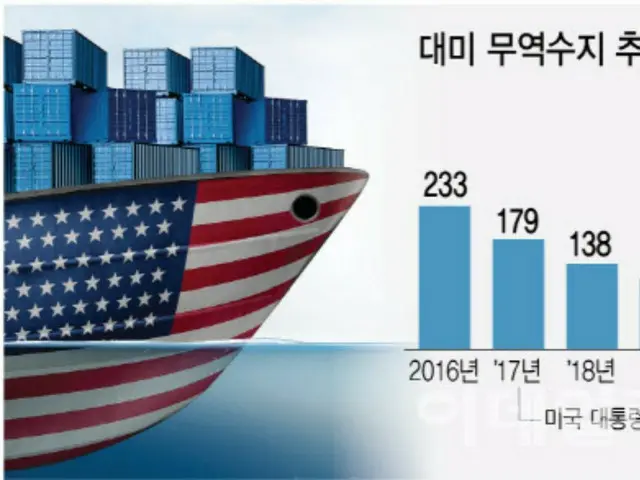According to the Ministry of Trade, Industry and Energy, the trade balance with the US in the first half of this year was a surplus of 28.7 billion dollars (approximately 4.51 trillion yen, provisional value based on customs clearance), up 55.1% from the previous year.
If this trend continues, Japan's annual trade balance with the United States is expected to exceed $50 billion, surpassing last year's record high of $44.4 billion (approximately 6.99 trillion yen).
Since last year, the United States has surpassed China to maintain its position as the country with the largest trade surplus in Korea. This is due to a rapid increase in exports to the United States, while imports from the United States have not changed significantly.
While exports to the United States increased by 16.8% to $64.3 billion (approximately 10.12 trillion yen), imports decreased by 3.2% to $35.6 billion (approximately 5.6 trillion yen). Exports to the United States increased rapidly in the first half of this year, while imports to China
Exports to the US (63.4 billion dollars / approx. 9.98 trillion yen) are also leading the way. Exports of automobiles to the US increased 28.9% to 19 billion dollars (approx. 2.99 trillion yen), and semiconductors (4
$500 million (approx. JPY 708 billion), auto parts ($4.1 billion (approx. JPY 645 billion), petroleum products ($2.7 billion (approx. JPY 425 billion), computers ($1.8 billion (approx. JPY 283 billion), batteries (approx. JPY 1.5 billion), and
Exports increased in many major industries, including batteries ($1.6 billion), other machinery ($1.5 billion), and motors and pumps ($1.2 billion).
The Korean market has become more competitive in the local market for its main products, and the supply chain has been restructured due to the US-China trade war and domestic-oriented trade policies such as the Inflation Reduction Act (IRA) have also contributed to this.
In particular, the US's decision to exclude China from the supply chain of cutting-edge industries such as semiconductors and secondary batteries, as well as key infrastructure, has also contributed to the Korean export market.
The problem is that former President Donald Trump, who is the favorite to be re-elected in the November US presidential election, sees the trade surpluses of South Korea and other allies with the US as "plunder."
On the 18th (local time), in his acceptance speech as the Republican presidential candidate, former President Trump said he would protect the US auto industry, saying, "Other countries are coming in and taking our jobs and plundering our country.
"We will not let them get away with it," he said. Former President Trump also said, "Our so-called allies have taken advantage of us for a long time," referring to South Korea, Japan, Germany and other nations.
In fact, from the U.S. perspective, the increase in South Korea's trade surplus with the U.S. is noticeable. According to U.S. government statistics, South Korea will
It was not even included in the top 10 trade deficit countries for the United States, but is expected to rise to ninth place ($43.9 billion) in 2022, down from eighth place ($51.4 billion) last year.
From January to May this year, it further rose to seventh place ($28.5 billion), behind China, Mexico, Vietnam, Germany, Ireland, and Japan.
The South Korean government, companies and economic organizations are also nervous about the trade policy of former President Trump, who gained the upper hand following the assassination attempt. Trade authorities have said that a significant portion of the increased trade surplus with the United States is due to U.S. supply chains.
The government is increasing contact with the Trump campaign as well as the U.S. government, with a strategy to highlight that this is due to increased investment by Korean companies in the U.S. in response to the restructuring of the light chain policy.
In addition, exports to the US of other machinery, which are considered investment-inducing exports, increased by 239.4% from the previous year.
"This is different from the expansion of general merchandise exports, and it occurred after the expansion of the U.S. supply chain and the export of machinery and equipment necessary for initial investment in response to the policy," he said.
"We have conveyed to the U.S. authorities that we are contributing to strengthening the protection of the economic sector," the official said. The official added, "As the U.S. presidential election is approaching, we have been in touch with not only the administration but also with policy-related agencies and government officials."
"We must use various channels, including among high-ranking government officials and the business community, to make our position known," he added.
2024/07/22 16:07 KST
Copyrights(C) Edaily wowkorea.jp 107

